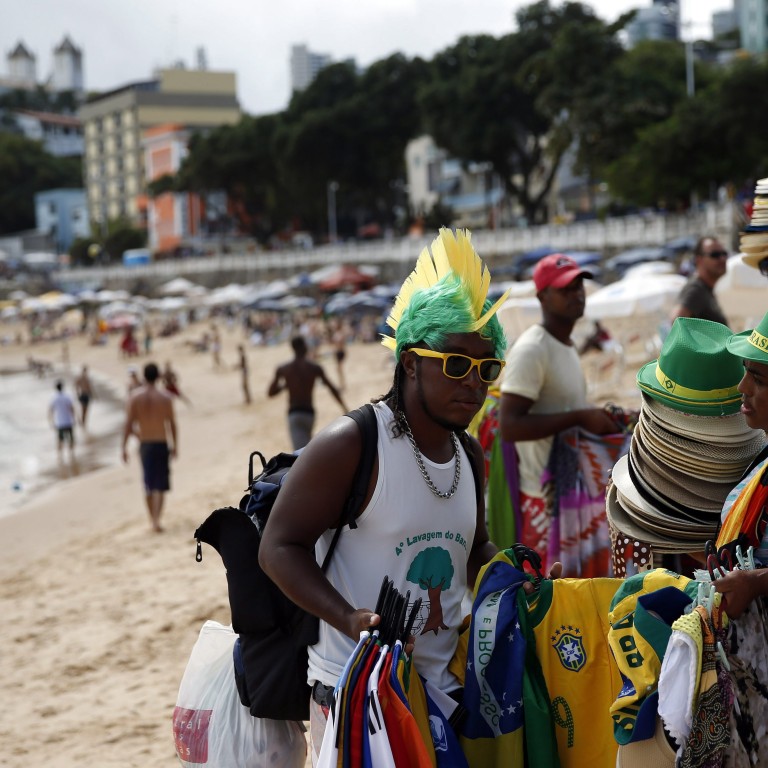
Road to Rio: A memorable detour into the unknown
It takes more than eight hours of travelling shoddy roads and a speedboat ride to get to Barra Grande, but it's well worth the trip
As the sun starts to set on day 23 of the tournament, the eyes of Brazil - and the world - are on Fortaleza's Estadio Castelao, where 60,000 people have turned the venue into a cauldron of noise and colour as the hosts take on Colombia for a place in the semi-finals.
The Santo Forte Bar Musical in the village of Barra Grande, around 1,200km due south on the Bahia coast, may not have quite the same draw, but for us it represents a more than acceptable substitute.
The semi-outdoor bar is packed with holidaying Brazilian families and groups of laid-back twenty- and thirty-somethings all transfixed on the big screen, while young kids in Brazil shirts run to and fro, only vaguely aware of the importance of the occasion. The atmosphere is upbeat, friendly and full of expectation, while the beer is incredibly cheap at 15 reals (HK$50) for all you can drink, so we find a spot at the back and settle in for the game. By Brazilian standards, Barra Grande is not particularly remote, but for us it seems close to the end of the earth.
After a whole day cooped up in the car, it's a real tonic to wander barefoot along the deserted beach and take in the wide blue skies and crashing waves that stretch as far as the eye can see
Up until now we've spent the vast majority of our time in and around the host cities, but through a friend of a friend we are offered a cut-price stay at an upscale beachside boutique hotel on the Marau Peninsula, around 150km as the crow flies south of Salvador, so we jump at the chance. Unfortunately for us, our rental car has to take a far more circuitous route than the crow, and after more than eight hours of mostly shoddy back roads through increasingly dense bush, we still haven't reached our destination.
Driving in Brazil, as we discover, is rarely as straightforward as it appears, and many of the roads that seem relatively major on our GPS turn out to be little more than dirt tracks peppered with potholes and makeshift speed bumps. It's slow going, in the dark with virtually no road signs, and we're starting to wonder if we've taken a calamitous wrong turn when finally we see a turn-off for the hotel, which we gratefully take.
It seems a ridiculously long way to come for just three nights between matches in Salvador, but when we wake up in the morning, we realise it's been worth the effort. Bahia is famed for its long, largely untouched stretches of pristine beaches fringed with palm trees, and the Marau Peninsula has one of the most beautiful. After a whole day cooped up in the car, it's a real tonic to wander barefoot along the deserted beach and take in the wide blue skies and crashing waves that stretch as far as the eye can see.
Spectacular as the beach is, it can't compete with the Brazil game, and so we jump aboard a speedboat for the 30-minute trip to Barra Grande, which lies at the northern tip of the peninsula. Travelling along the inlet between the peninsula and the mainland, we pass miles of untouched coast, dotted with the occasional house, some of which are rather grand. Despite its remoteness - or, rather, because of it, the area is a sought-after holiday location, and several rich Brazilians have homes here.
Back at the bar, the crowd goes wild with delight as David Luiz thumps in a 30-yard free kick and Brazil hold on to claim victory.
On the speedboat back, we cut through the pitch-black darkness of the estuary, lit only by a blanket of stars and a half-moon hanging low on the horizon. It seems like a fitting way to end our memorable detour into the unknown.

